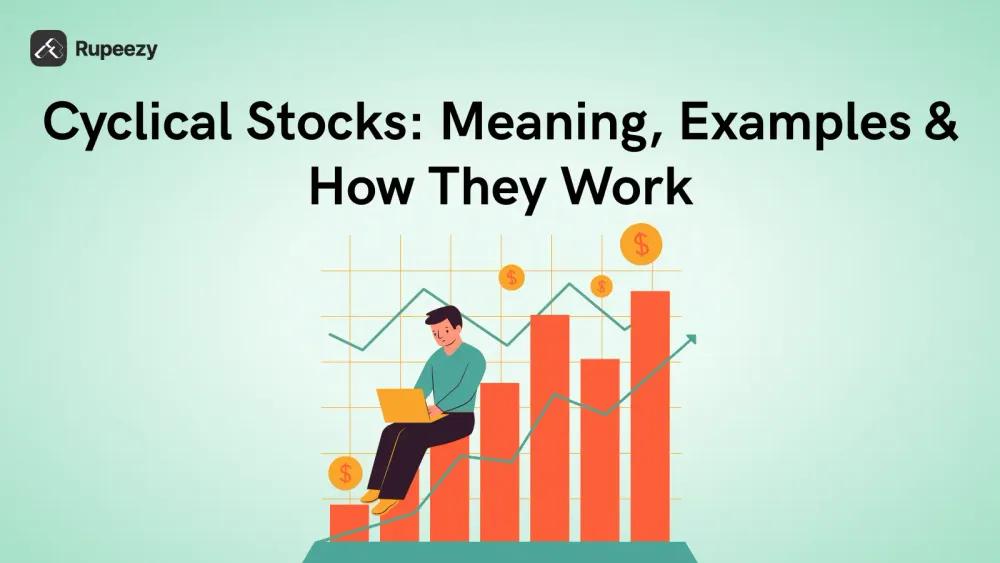Cyclical Stocks: Meaning, Examples & How They Work


00:00 / 00:00
Many people check the records of the stocks when they plan to invest in the stock market. Some might rely on the insights shared by the experts and would work as per that. But no matter what you do, you need to understand the market movements well. With that being said, it is important to understand stock and share you are planning to invest in.
Now, you must be wondering why? Well, you must have heard of simple statements like gold prices will rise near the festive season. Right? Well, this happens because of their cyclical nature. And this is where you need to know the cyclical stocks.
In simpler terms, there are some stocks that are impacted by the market or economic cycles. But what are those exactly? Well, let us explore the meaning and their working in detail in the guide over here. So, let us start with what are cyclical stocks here.
What Are Cyclical Stocks?
Cyclical stocks are shares of companies whose performance depends directly on the overall economic condition. When the economy expands, these companies enjoy higher sales. This helps with better profits and stronger investor confidence. All these work together to push their stock prices up.
On the other hand, when the economy slows, their demand and revenues drop. This leads to a fall in stock value. Now, it is important to note that this movement in these cyclical stocks in India is temporary. This means that, as the economic performance changes, these stocks will react differently.
They are most commonly found in sectors that rely heavily on consumer spending or large business investments. Considering this, you will find that these stocks fall under automobiles, real estate, hospitality, travel, and construction. In fact, these stocks also have faster settlement cycles at times.
Key Features of Cyclical Stocks
Economy Dependent: Their growth is closely linked to economic cycles. Any instance of expansion and contraction will have a direct impact on the stock performance.
High Volatility: These stocks work based on the market conditions. So, the prices will rise and fall very quickly, which makes them hard to manage at times.
Strong Returns in Booms: They outperform defensive stocks. This is mainly beneficial when the economy is growing. This makes them a good option for consistent results.
Weak Performance in Recessions: The chances of a fall in earnings are quite high. So, when the demand slows down, the prices will change quickly.
Timing Sensitive: The right entry and exit points are crucial to make profits.
Consumer-Driven: Demand for their goods and services often depends on disposable income.
In simple words, cyclical stocks rise and fall with the economy’s heartbeat. At times, you will see that these stocks belong to the fastest-growing industries in the economy. Hence, understanding them and their work becomes really important.
How Do Cyclical Stocks Work?
Cyclical stocks move in sync with the economy’s natural rhythm of growth, slowdown, recession, and recovery. In other words, their performance depends on how people spend, borrow, and invest during these different phases.
So, when the company is strong, these stocks perform better, and when the economy is weak, these stocks will fall. Here is how cyclical stocks in India behave through different economic phases:
1. Expansion Phase
During growth, people spend more. This is mainly on simple commodities like cars, homes, travel, and luxury goods. Companies in these sectors report higher profits. This impacted their stocks, and they usually deliver strong returns.
2. Peak Phase
The economy reaches its highest point. Consumer spending is strong. But after a while, you will see that there is a fall as well. The economy is coming back to equilibrium. During this phase, these stocks will get back to normal, and this is a sign of correction.
3. Recession Phase
When the economy contracts, unemployment rises. This has a direct impact on consumer spending, which declines. Demand for cars, homes, and travel drops. Now, during this period, you will find that trading and investing are slow. This will make the cyclical stock prices fall sharply.
4. Recovery Phase
As the economy stabilizes, spending slowly returns. This is the time when investors will find that prices are now improving. Companies are recovering, and their market value of stocks is rising as well. This will impact their earnings too.
In essence, cyclical stocks mirror economic momentum. Recognizing where the economy stands helps investors make smarter buy and sell decisions for the stocks.
Pros and Cons of Cyclical Stocks
Cyclical stocks can offer impressive returns. But unlike any other investment option, they also come with their own pros and cons. Knowing these is really important so that you can have better trading strategies in place. So, here are the pros and cons of the same that you must know of:
Pros of Cyclical Stocks:
High Growth Potential: They often outperform other stocks during economic expansions.
Profit from Market Cycles: These are a great choice for smart investors. They can buy low during recessions. This will help them to sell high during booms.
Portfolio Diversification: They add a growth element. By doing so, they help to balance defensive or fixed-income holdings.
Economic Indicator: Their movement often signals broader market trends and business confidence.
Opportunities for Traders: The volatility is high. This allows you to do multiple small trades to gain a good amount. Also, you can try arbitrage trading for higher returns.
Cons of Cyclical Stocks:
High Volatility: The changes in the prices are quite swift. This basically means that you need to be swift in your decisions, as it can impact your trade outcome.
Poor Downturn Performance: They tend to underperform or even incur heavy losses during recessions.
Timing Risk: Entering or exiting at the wrong time can reduce profits or cause losses.
Unpredictable Earnings: These companies may have fluctuating revenue. This means the profits may vary greatly throughout the year, which can be a bit hard to keep track of.
Long Recovery Periods: Some sectors take years to bounce back after economic slowdowns. So, you might need to have a longer holding period.
In other words, cyclical stocks in India reward patience and timing. But at the same time, these funds demand close attention to economic signals and sector trends.
Difference Between Cyclical and Non-Cyclical Stocks
Cyclical and non-cyclical stocks both depend on the economy. But their behavior is quite different. This makes it really important for an investor to understand both of these to ensure they make the right investment call. So, here are the key differences:
Basis | Cyclical Stocks | Non-Cyclical Stocks |
Economy Link | Have a high impact on the economy and consumer demand for them. | Not so much impacted by the economic ups and downs. |
Performance in Recession | Tend to underperform as demand is low. | It can stay stable or even perform well. |
Performance in Boom | Ensure a high return and overperform due to high demand. | Steady and limited growth is usually expected. |
Volatility | Quite high and large price swings can happen. | Not so much, and price swings are manageable. |
Examples | Automobiles, real estate, metals, travel, and luxury goods | FMCG, healthcare, utilities, telecom |
Investor Type | Suitable for active investors with higher risk tolerance. | Ideal for conservative or long-term investors. |
Earnings Pattern | You will find fluctuations based on economic conditions. | This is rather stable with no to very low changes. |
Who Should Invest in Cyclical Stocks
Cyclical stocks are not for everyone. They suit investors who can handle market fluctuations and have the patience. These investors are usually comfortable with higher risk. They are the ones who are looking for high returns as well. So, based on the same, certain investors who can go for these are:
Experienced Investors: Those who understand market trends. They are the ones who can spot economic turning points. Also, these investors know fundamental and technical analysis well.
Long-Term Investors: These are the people who are looking to create a long-term portfolio. They are ready to wait when there is a downfall.
Active Traders: Individuals who monitor markets regularly. They are more into intraday trading or similar ones. These trades know when to enter and exit well.
Diversified Portfolio Holders: Investors who already hold stable, defensive stocks and want to add growth exposure.
Cyclical stocks in India are best suited for investors who enjoy analyzing market trends, can tolerate volatility, and have the discipline to act when others hesitate.
Conclusion
Cyclical stocks can be powerful wealth builders. But this is possible when you select these stocks at the correct time. They reflect the heartbeat of the economy. These are the ones that rise with prosperity and slow down during downturns.
These are great for investors who can wait and know the market signs well. These can offer strong gains over time. However, it is wise to balance your portfolio. This will ensure that you earn a stable return, which can help with wealth creation.
So, if you are planning to start your journey, get connected with the experts at Rupeezy. It's your trusted partner for smart and seamless investing.
FAQs
What makes cyclical stocks more volatile than others?
Their prices rise and fall quickly because they depend on various factors. These include economic conditions, consumer demand, and business cycles. Hence, they are very volatile in nature.
Can cyclical stocks give steady income?
No, their earnings vary with the economy. This is why you will not find stable dividend payments for such stocks.
How can investors track economic cycles to plan entry or exit?
There are various factors that you can monitor. When the inverter keeps an eye on them, he can identify the signs. This can help to decide on entry and exit.
Are cyclical stocks suitable for small investors?
They can be, if chosen carefully. Small investors can invest through sectoral mutual funds or ETFs. This will help with better diversification.
How do global trends influence cyclical stocks?
Changes in global trade, commodity prices, and political stability can directly affect industries like metals, auto, and real estate, impacting cyclical stock performance.
The content on this blog is for educational purposes only and should not be considered investment advice. While we strive for accuracy, some information may contain errors or delays in updates.
Mentions of stocks or investment products are solely for informational purposes and do not constitute recommendations. Investors should conduct their own research before making any decisions.
Investing in financial markets are subject to market risks, and past performance does not guarantee future results. It is advisable to consult a qualified financial professional, review official documents, and verify information independently before making investment decisions.

All Category









